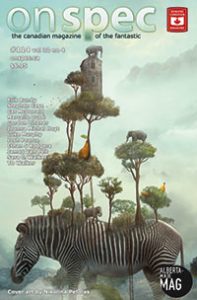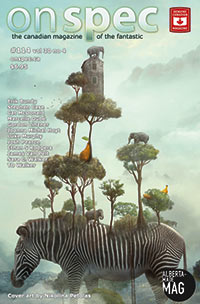Rich Horton Reviews Short Fiction: London Centric, Uncanny, On Spec, Pulp Literature, and The New Yorker
 London Centric, Ian Whates, ed. (NewCon Press) March 2020.
London Centric, Ian Whates, ed. (NewCon Press) March 2020.
Uncanny 11-12/20
On Spec #114
Pulp Literature Summer ’20
The New Yorker 11/9/20
Here’s an intriguing new anthology from England’s NewCon Press, London Centric: Tales of Future London, edited by Ian Whates. The anthology is mostly exactly what it says, a collection of looks at a future London, but one of the very best stories is mostly set in the past, shortly after World War II. This is Aliya Whiteley‘s “Fog and Pearls at the King’s Cross Junction“. Connie Prisman runs away to London to get a job with a Mr. Rodderick, who operates a lighthouse. Curiously, the lighthouse is in the city, nowhere close to a coast. Connie soon learns that Roddie’s primary business is dealing with pearls. She also learns something quite unusual about the lighthouse during one of London’s legendary pea soup fogs… it seems the light does rescue some people from the thick smog. As for the pearls? I’ll leave that to be discovered, but this is a striking, evocative fantasy with a distinct tinge of horror.
I also liked M.R. Carey‘s “War Crimes“, set in a future in which everyone is connected to others by the “Drift,” which lets them directly sense thoughts (when allowed) and emotions. But what of the world before the drift? A hint of how that ended is shown, as Huss Begum, one of the very few “military” left, investigates an anomaly in London 21 – an area of the city that was frozen in time by a “time bomb.” The anomaly involves a person moving ever so slightly – which means they might be about ready to exit the stasis, which might be very dangerous, because of the energy involved – or it might be a different sort of energy, ultimately much scarier, leaving Huss to a terrible duty.
Uncanny‘s final 2020 issue offers some straight SF, which can be one of its strongest features – when a magazine with something of a tropism toward fantasy or slipstream publishes SF (as Uncanny always has) they gravitate toward the best or strangest. Ken Liu‘s “50 Things Every AI Working With Humans Should Know” ends with the list the title promises – an excellent list, very sharp in evoking what AIs might be like, also suggesting what any minority might perceive, with a lovely soupçon of fan service (“ships on fire off the shoulder of Orion”), but it begins with the story of the origin of the list, and of the human and the AI at the center of it, which is perfectly ambiguous and illuminating.
“Words We Say Instead” by Brit E.B. Hvide is also good, and also about AI, as a former smartship pilot searches for potential remainders of smartships who were destroyed when they were deemed superfluous – and dangerous – after the war was over. Her guilt, her fellow pilots’ guilt, and the wants of the smartships are effectively portrayed.
The latest issue of Canada’s venerable magazine On Spec features a fine story from James Van Pelt, “After the War“. It’s told by a man whose job is to keep track of the alien invaders on Earth after their invasion failed. Instead of killing all the survivors, the plan is just to make sure they don’t get up to mischief, and we see him encounter a couple of them, who are struggling to get by in the margins of human society. They’re a sad bunch after all… or are they? I also enjoyed Ethan S Rodgers‘s “The Limbic Initiative“, about a sentient android hiding in plain sight as a rural farmer in a future in which they’ve been banned – with something like a child to protect.
Pulp Literature is another Canadian magazine, a bit less venerable than On Spec… but very well worth your attention. The Summer issue includes a great many pieces of flash fiction, some of them contest winners, but I thought the best were unrelated to the contest: for example, Kim Harbridge‘s “Projections“, a brief ode to the stars in a future where they are invisible, or Hannah van Didden‘s gleefully fierce “The Lion“, in which the title creature visits a consulting firm. The best story this issue is longer, though, Jakob Drud‘s “Culinary Subjugation“, which reminded me a bit of van Pelt’s On Spec story in that it featured alien invaders – but perhaps a bit more of a certain very famous Damon Knight story (and Twilight Zone episode). Campton is a food inspector for the Pitonians, who have taken over Earth and confined the few human survivors in a Preserve. It seems the Pitonians eat almost anything… including, well, you can guess. Campton, hated by the other humans for what they see is collaboration, is desperately trying to figure out what really drives the Pitonian’s culinary obsessions… and what he finds is… unexpected.
It’s been a while since I’ve seen a piece of fantastika from George Saunders in The New Yorker, but here’s a new one: “Ghoul“. Brian is a “Squatting Ghoul” at what seems to be a huge underground theme park, with sections devoted to the Old West, or the undersea, or, in Brian’s case, the Maws of Hell. We learn quickly that the rules of this place are very strict, especially concerning discussing anything negative about it, such as the occasional floods, or the paucity of visitors. Punishment for violation is being kicked to death, which puts Brian in a quandary when a friend blurts something forbidden – for failing to report a violation is as bad as committing one. Soon he’s trapped in a conspiracy of “ratting out” people before they can rat you out in return, especially as he falls in love with a woman Monitor… and then he is faced with a revelation about the true nature of their milieu. The narrative voice is a very Saundersian comicly naïve concoction, leading to a horrifying conclusion.
Recommended Stories
“War Crimes”, M.R. Carey (London Centric)
“Culinary Subjugation”, Jakob Drud (Pulp Literature Summer ’20)
“Words We Say Instead”, Brit E.B. Hvide (Uncanny 11-12/20)
“50 Things Every AI Working With Humans Should Know”, Ken Liu (Uncanny 11-12/20)
“Ghoul”, George Saunders (The New Yorker 11/9/20)
“After the War”, James Van Pelt (On Spec #114)
“Fog and Pearls at the King’s Cross Junction”, Aliya Whiteley (London Centric)
Rich Horton works for a major aerospace company in St. Louis MO. He has published over a dozen anthologies, including the yearly series The Year’s Best Science Fiction and Fantasy from Prime Books, and he is the Reprint Editor for Lightspeed Magazine. He contributes articles and reviews on SF and SF history to numerous publications.
This review and more like it in the December 2020 issue of Locus.
 While you are here, please take a moment to support Locus with a one-time or recurring donation. We rely on reader donations to keep the magazine and site going, and would like to keep the site paywall free, but WE NEED YOUR FINANCIAL SUPPORT to continue quality coverage of the science fiction and fantasy field.
While you are here, please take a moment to support Locus with a one-time or recurring donation. We rely on reader donations to keep the magazine and site going, and would like to keep the site paywall free, but WE NEED YOUR FINANCIAL SUPPORT to continue quality coverage of the science fiction and fantasy field.
©Locus Magazine. Copyrighted material may not be republished without permission of LSFF.






